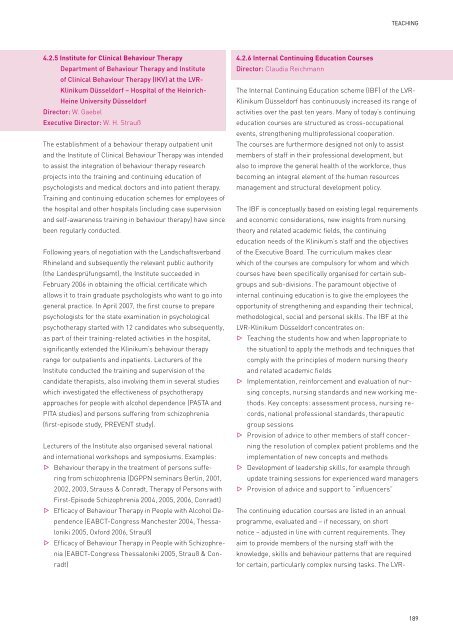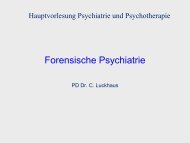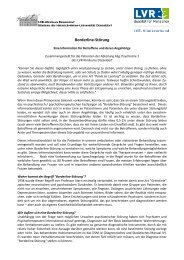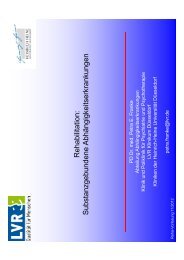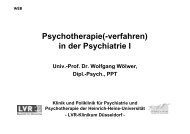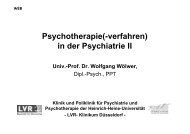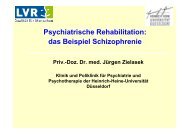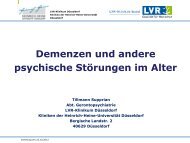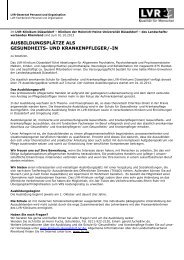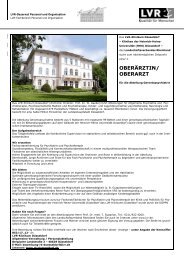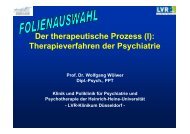LVR-Klinikum Düsseldorf Hospital of the Heinrich-Heine University ...
LVR-Klinikum Düsseldorf Hospital of the Heinrich-Heine University ...
LVR-Klinikum Düsseldorf Hospital of the Heinrich-Heine University ...
You also want an ePaper? Increase the reach of your titles
YUMPU automatically turns print PDFs into web optimized ePapers that Google loves.
4.2.5 Institute for Clinical Behaviour Therapy<br />
Department <strong>of</strong> Behaviour Therapy and Institute<br />
<strong>of</strong> Clinical Behaviour Therapy (IKV) at <strong>the</strong> <strong>LVR</strong>-<br />
<strong>Klinikum</strong> <strong>Düsseldorf</strong> – <strong>Hospital</strong> <strong>of</strong> <strong>the</strong> <strong>Heinrich</strong>-<br />
<strong>Heine</strong> <strong>University</strong> <strong>Düsseldorf</strong><br />
Director: W. Gaebel<br />
Executive Director: W. H. Strauß<br />
The establishment <strong>of</strong> a behaviour <strong>the</strong>rapy outpatient unit<br />
and <strong>the</strong> Institute <strong>of</strong> Clinical Behaviour Therapy was intended<br />
to assist <strong>the</strong> integration <strong>of</strong> behaviour <strong>the</strong>rapy research<br />
projects into <strong>the</strong> training and continuing education <strong>of</strong><br />
psychologists and medical doctors and into patient <strong>the</strong>rapy.<br />
Training and continuing education schemes for employees <strong>of</strong><br />
<strong>the</strong> hospital and o<strong>the</strong>r hospitals (including case supervision<br />
and self-awareness training in behaviour <strong>the</strong>rapy) have since<br />
been regularly conducted.<br />
Following years <strong>of</strong> negotiation with <strong>the</strong> Landschaftsverband<br />
Rhineland and subsequently <strong>the</strong> relevant public authority<br />
(<strong>the</strong> Landesprüfungsamt), <strong>the</strong> Institute succeeded in<br />
February 2006 in obtaining <strong>the</strong> <strong>of</strong>ficial certificate which<br />
allows it to train graduate psychologists who want to go into<br />
general practice. In April 2007, <strong>the</strong> first course to prepare<br />
psychologists for <strong>the</strong> state examination in psychological<br />
psycho<strong>the</strong>rapy started with 12 candidates who subsequently,<br />
as part <strong>of</strong> <strong>the</strong>ir training-related activities in <strong>the</strong> hospital,<br />
significantly extended <strong>the</strong> <strong>Klinikum</strong>’s behaviour <strong>the</strong>rapy<br />
range for outpatients and inpatients. Lecturers <strong>of</strong> <strong>the</strong><br />
Institute conducted <strong>the</strong> training and supervision <strong>of</strong> <strong>the</strong><br />
candidate <strong>the</strong>rapists, also involving <strong>the</strong>m in several studies<br />
which investigated <strong>the</strong> effectiveness <strong>of</strong> psycho<strong>the</strong>rapy<br />
approaches for people with alcohol dependence (PASTA and<br />
PITA studies) and persons suffering from schizophrenia<br />
(first-episode study, PREVENT study).<br />
Lecturers <strong>of</strong> <strong>the</strong> Institute also organised several national<br />
and international workshops and symposiums. Examples:<br />
s Behaviour <strong>the</strong>rapy in <strong>the</strong> treatment <strong>of</strong> persons suffering<br />
from schizophrenia (DGPPN seminars Berlin, 2001,<br />
2002, 2003, Strauss & Conradt, Therapy <strong>of</strong> Persons with<br />
First-Episode Schizophrenia 2004, 2005, 2006, Conradt)<br />
s Efficacy <strong>of</strong> Behaviour Therapy in People with Alcohol Dependence<br />
(EABCT-Congress Manchester 2004, Thessaloniki<br />
2005, Oxford 2006, Strauß)<br />
s Efficacy <strong>of</strong> Behaviour Therapy in People with Schizophrenia<br />
(EABCT-Congress Thessaloniki 2005, Strauß & Conradt)<br />
4.2.6 Internal Continuing Education Courses<br />
Director: Claudia Reichmann<br />
teACHinG<br />
The Internal Continuing Education scheme (IBF) <strong>of</strong> <strong>the</strong> <strong>LVR</strong>-<br />
<strong>Klinikum</strong> <strong>Düsseldorf</strong> has continuously increased its range <strong>of</strong><br />
activities over <strong>the</strong> past ten years. Many <strong>of</strong> today’s continuing<br />
education courses are structured as cross-occupational<br />
events, streng<strong>the</strong>ning multipr<strong>of</strong>essional cooperation.<br />
The courses are fur<strong>the</strong>rmore designed not only to assist<br />
members <strong>of</strong> staff in <strong>the</strong>ir pr<strong>of</strong>essional development, but<br />
also to improve <strong>the</strong> general health <strong>of</strong> <strong>the</strong> workforce, thus<br />
becoming an integral element <strong>of</strong> <strong>the</strong> human resources<br />
management and structural development policy.<br />
The IBF is conceptually based on existing legal requirements<br />
and economic considerations, new insights from nursing<br />
<strong>the</strong>ory and related academic fields, <strong>the</strong> continuing<br />
education needs <strong>of</strong> <strong>the</strong> <strong>Klinikum</strong>’s staff and <strong>the</strong> objectives<br />
<strong>of</strong> <strong>the</strong> Executive Board. The curriculum makes clear<br />
which <strong>of</strong> <strong>the</strong> courses are compulsory for whom and which<br />
courses have been specifically organised for certain subgroups<br />
and sub-divisions. The paramount objective <strong>of</strong><br />
internal continuing education is to give <strong>the</strong> employees <strong>the</strong><br />
opportunity <strong>of</strong> streng<strong>the</strong>ning and expanding <strong>the</strong>ir technical,<br />
methodological, social and personal skills. The IBF at <strong>the</strong><br />
<strong>LVR</strong>-<strong>Klinikum</strong> <strong>Düsseldorf</strong> concentrates on:<br />
s Teaching <strong>the</strong> students how and when (appropriate to<br />
<strong>the</strong> situation) to apply <strong>the</strong> methods and techniques that<br />
comply with <strong>the</strong> principles <strong>of</strong> modern nursing <strong>the</strong>ory<br />
and related academic fields<br />
s Implementation, reinforcement and evaluation <strong>of</strong> nursing<br />
concepts, nursing standards and new working methods.<br />
Key concepts: assessment process, nursing records,<br />
national pr<strong>of</strong>essional standards, <strong>the</strong>rapeutic<br />
group sessions<br />
s Provision <strong>of</strong> advice to o<strong>the</strong>r members <strong>of</strong> staff concerning<br />
<strong>the</strong> resolution <strong>of</strong> complex patient problems and <strong>the</strong><br />
implementation <strong>of</strong> new concepts and methods<br />
s Development <strong>of</strong> leadership skills, for example through<br />
update training sessions for experienced ward managers<br />
s Provision <strong>of</strong> advice and support to “influencers”<br />
The continuing education courses are listed in an annual<br />
programme, evaluated and – if necessary, on short<br />
notice – adjusted in line with current requirements. They<br />
aim to provide members <strong>of</strong> <strong>the</strong> nursing staff with <strong>the</strong><br />
knowledge, skills and behaviour patterns that are required<br />
for certain, particularly complex nursing tasks. The <strong>LVR</strong>-<br />
189


